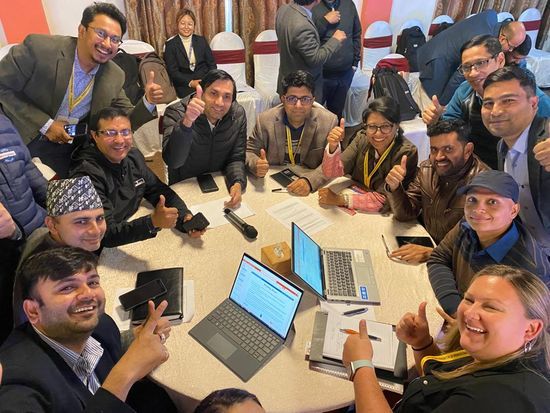
A Joint External Evaluation (JEE) is a voluntary process in which a team of national and international experts jointly assess country capacity under the International Health Regulations (IHR).
This course aims to provide the learners, country teams, external experts and technical writers with an understanding of the JEE process, its objectives, principles, and methods. The course will also demonstrate how the JEE results can inform the strengthening of health security capacities and the development and implementation of the National Action Plan for Health Security (NAPHS).
Photo credits: WHO/N. Bruinsma
Language: English
Health topic
Course information
Overview: A JEE contributes to the monitoring and evaluation of core capacities under the IHR and is a key component under the IHR Monitoring and Evaluation Framework (IHR MEF). A self-evaluation by the country is followed by an assessment by an independent JEE team. The assessment is done using a standardized tool that assesses 19 technical areas across 4 domains: prevent, detect, respond, and other hazards and points of entry.
The JEE training programme comprises various courses designed to equip JEE stakeholders with essential information. The country team plays a pivotal role in coordinating the JEE process and assessing the nation's preparedness capacities. Working alongside the country, the external evaluation team, consisting of JEE team leadership, technical area leads, and technical writers, collaborates closely to identify priority actions. These actions aim to streamline the formulation of the National Action Plan for Health Security, ensuring comprehensive development and implementation strategies.
Course duration: Approximately 2 hours.
Certificate: A Certificate of Achievement will be available to participants who score at least 80% of the total points available in the final assessment. Participants who receive a Certificate of Achievement can also download an Open Badge for this course. Click here to learn how.
What you'll learn
- describe the purpose of the International Health Regulations (IHR) and the IHR Monitoring and Evaluation Framework (IHR MEF);
- explain the Joint External Evaluation as component of the IHR MEF, the tool and process;
- discuss the self-evaluation process in the JEE and the roles of the country team;
- describe the external evaluation process in the JEE and the roles of the external evaluation team;
- outline the key outcomes in the JEE contained in the report
- list relevant JEE resources and platform.
Course contents
Module 1: Introduction:
This module introduces the Joint External Evaluation and the contents of the course.Module 2: International Health Regulations:
This module provides a broad overview of the International Health Regulations and the monitoring and evaluation framework which forms the basis of a Joint External Evaluation (JEE).Module 3: The JEE Tool:
This module will introduce the JEE tool, its purpose, key domains assessed and the overall JEE process.Module 4: Country responsibilities in the JEE:
This module will describe the country responsibilities when preparing the JEE and conducting self-evaluation.Module 5: External evaluation - The team:
This module will focus on the external evaluation team - selection, composition, qualification and responsibilities.Module 6: External evaluation - The mission:
This module will explain the format of the JEE mission and the process by which the scores and priority actions are determined.Module 7: External evaluation - Cultural competences, preventing sexual abuse and exploitation and team member safety:
This module will describe the competences and conduct expected from the external evaluation team.Module 8: JEE Resources:
This module will describe the different JEE resources and platforms.Final Assessment
Enroll me for this course
Certificate Requirements
- Gain a Record of Achievement by earning at least 80% of the maximum number of points from all graded assignments.
- Gain an Open Badge by completing the course.